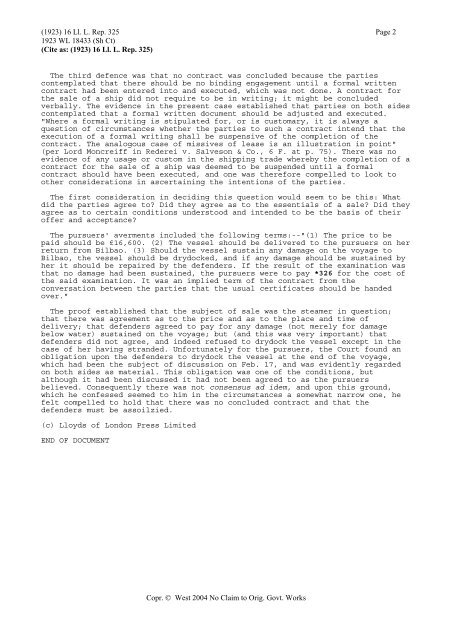Tesco v Constain - Thomson Reuters
Tesco v Constain - Thomson Reuters
Tesco v Constain - Thomson Reuters
Create successful ePaper yourself
Turn your PDF publications into a flip-book with our unique Google optimized e-Paper software.
(1923) 16 Ll. L. Rep. 325 Page 21923 WL 18433 (Sh Ct)(Cite as: (1923) 16 Ll. L. Rep. 325)The third defence was that no contract was concluded because the partiescontemplated that there should be no binding engagement until a formal writtencontract had been entered into and executed, which was not done. A contract forthe sale of a ship did not require to be in writing; it might be concludedverbally. The evidence in the present case established that parties on both sidescontemplated that a formal written document should be adjusted and executed."Where a formal writing is stipulated for, or is customary, it is always aquestion of circumstances whether the parties to such a contract intend that theexecution of a formal writing shall be suspensive of the completion of thecontract. The analogous case of missives of lease is an illustration in point"(per Lord Moncreiff in Rederei v. Salveson & Co., 6 F. at p. 75). There was noevidence of any usage or custom in the shipping trade whereby the completion of acontract for the sale of a ship was deemed to be suspended until a formalcontract should have been executed, and one was therefore compelled to look toother considerations in ascertaining the intentions of the parties.The first consideration in deciding this question would seem to be this: Whatdid the parties agree to? Did they agree as to the essentials of a sale? Did theyagree as to certain conditions understood and intended to be the basis of theiroffer and acceptance?The pursuers' averments included the following terms:--"(1) The price to bepaid should be £16,600. (2) The vessel should be delivered to the pursuers on herreturn from Bilbao. (3) Should the vessel sustain any damage on the voyage toBilbao, the vessel should be drydocked, and if any damage should be sustained byher it should be repaired by the defenders. If the result of the examination wasthat no damage had been sustained, the pursuers were to pay *326 for the cost ofthe said examination. It was an implied term of the contract from theconversation between the parties that the usual certificates should be handedover."The proof established that the subject of sale was the steamer in question;that there was agreement as to the price and as to the place and time ofdelivery; that defenders agreed to pay for any damage (not merely for damagebelow water) sustained on the voyage; but (and this was very important) thatdefenders did not agree, and indeed refused to drydock the vessel except in thecase of her having stranded. Unfortunately for the pursuers, the Court found anobligation upon the defenders to drydock the vessel at the end of the voyage,which had been the subject of discussion on Feb. 17, and was evidently regardedon both sides as material. This obligation was one of the conditions, butalthough it had been discussed it had not been agreed to as the pursuersbelieved. Consequently there was not consensus ad idem, and upon this ground,which he confessed seemed to him in the circumstances a somewhat narrow one, hefelt compelled to hold that there was no concluded contract and that thedefenders must be assoilzied.(c) Lloyds of London Press LimitedEND OF DOCUMENTCopr. © West 2004 No Claim to Orig. Govt. Works
















